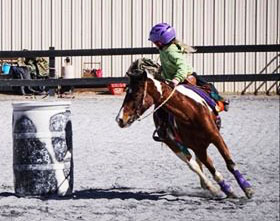Ponies: the Elementary Teachers of the Equine Industry
- Aug 9, 2018
- 5 min read
As a horse and pony trainer, clinician and owner of the Performance Pony Company, Camarie Widmer has seen firsthand the impact that ponies have on children.
In Widmer’s opinion, good ponies are the elementary teachers of the equine industry. They educate the next generation of cowboys and cowgirls on basics of horsemanship and life from the ground up. Skills like confidence, independence, determination, responsibility, hard work, patience, focus and pride just to name a few.
From the first glance children are generally more confident around ponies. A pony is smaller in height and length, making them less intimidating than horses. Some kids look at a thousand pound plus horse and instantly think, “no way”! When they look at a pony they see a shorter, smaller animal that is closer to the ground and more on their level. Not to mention, most are cute!
Ponies allow children to catch, groom, clean feet, saddle, bridle and mount their own. Learning these skills gives children independence and responsibility that makes them feel important and worthy. These skills combined build confidence, which is another crucial life skill.
Celenia Douglas from Pearsall, TX said, “Our pony gave our daughter confidence. His smaller stature made her feel more comfortable. It also made it easier to handle tasks like saddling, grooming, and trailering, giving her more responsibility that she couldn’t have with her big horse.”
Parents are also less intimidated by ponies. Most parents are more comfortable knowing their kids are only a few feet from the ground if they fall off. Parents who aren’t experienced with horses also tend to feel more comfortable being able to control the pony.
Kenzie Gunter from Oskaloosa, IA remembers when she had a pony, “My parents felt comfortable sending me out on my own to catch, saddle my pony and ride her around the yard.”
Anyone who has been around ponies knows they have a reputation for being stubborn and ornery. While this can come from a variety of different causes, children learn to get determined, focus on their goal and gain control of the situation when their pony “acts up.”
Jesse Knight, a mom of a little cowgirl, says, “She was only four years old when her App pony that I was going to buy threw her sky high, literally a bronc. Well, she got up, dusted off and said, ‘Momma I'm going to fix her, give her to me.’ I asked her if she still wanted the pony, she looked at me and said, ‘yes, I do! I'm going show you how it's done.’ I laughed for days following because it showed her she can get hurt but it also showed her determination to make sure the pony knew she was not giving up.”
Often you can put that same child on a big, strong, intimidating horse and the child will get scared and quit. Parents rightfully get scared in this situation too.
Amanda Underhill from Boone, IA says, “Giving up isn’t an option at our house. We all know a pony can be stubborn at times and that is what teaches the child how to make the pony to listen to them, accomplish the task and gain confidence.” These lessons all relate to life and learning how to stand up to bullies and people that try to knock us down.
When Marlee Stowell, age 8 from Montezuma, IA, started coming for lessons at Widmer’s, she used the phrase, “I can’t” in everything she did. Her grandma had told Widmer she lacked confidence in school and other areas in life. Her lesson pony was a 46-inch paint pony named, “Fearless Frieda Fae”. Marlee spent her hour on Wednesdays learning to do everything from the ground up by herself. We banned the words “can’t, won’t and don’t”. They were replaced with “I can” and “I will.”
After a month of lessons, Marlee came to Widmer and said, “I don’t even use those words in school or at home anymore.” Without the help of Fearless Frieda Fae, she might still be saying “I can’t”.
It’s important to remember that it takes a combination of factors for ponies to be great teachers. At the Performance Pony Company, Widmer feels the first step in purchasing a pony is to know the skill level of the rider. Each new rider should take a couple lessons and ask an experienced horse person the kind of pony they recommend. Some children are ready for a pony that moves on its own, while other children need a pony that won’t move unless directed. Fitting a pony to a child is like making friends. Some personalities mesh quickly, others never do.
Consider before buying what you want to do with the pony, i.e. trail ride, rodeo, parades, ride in the yard, etc. Some ponies are great yard ponies but have never been to town. Before going to look at the pony ask questions related to the pony’s experience, vices, overall health including feet, teeth, tack, location and price. Ask to see pictures and videos. Again, ask a trusted horseperson to help with the process.
Next, try the pony; try fifteen ponies! Many people make the mistake of buying the first pony they try. When your child is excited, it’s easy to overlook the little things and impulse buy, especially for first time buyers. Widmer recommends going without a trailer the first time. Try the pony, discuss it and then sleep on it. If the pony is still a good fit the next day, then hook up the trailer. It’s generally cheaper to make the drive twice than it is to get stuck with the wrong pony.
Once you’ve bought a pony, the pony and rider need tools like properly fitting bits and tack. Ask the people you purchased the pony from what they recommend. If they aren’t sure, ask your trusted horseperson. Properly fitting bits give children more control and the ponies more comfort which creates a better experience for everyone. Buy a saddle that fits the pony. Saddles that are too big or too small can cause pinching and soreness and lead to unruly behaviors. Parents, guardians and providers have a responsibility to make sure they have the proper tools to have the best experience possible.
Widmer’s Performance Pony Company was created specifically to provide these tools. She saw too many nice ponies and willing children not get along simply because they didn’t have the proper bits and tack. The Performance Pony Company provides products to bridge the pony tack gap.
Pony Pro, Morgan Girdler, talks about her experience after purchasing tack that fit her pony, “The bad pony who only knew how to buck and complete queen laps with blazing speed mid barrel pattern has become quite the gentleman. Performance Pony Company helped make this possible.”
Joshua Mangan says, "Really love those pony bits. Having a bit that fits and doesn't slop around in their mouth made a huge difference in my boys being able to neck rein and in general get their ponies to do what they want them to do."
Horses, ponies and life in general take hard work. The skills ponies teach children at a young age don’t just prepare them for a bigger horse; these skills prepare them for life. The responsibility and independence they gain when they can catch, groom, saddle, etc. by themselves gives children confidence. The pony attitude teaches a child how to stand up for themselves and gain control of a situation. Working hard and staying dedicated, combined with the proper tools, teaches children to appreciate the process. As they accomplish goals, they learn to be proud of themselves and their pony as a team. When you think about it, ponies important in building the next generation of cowboys and cowgirls.



















































Comments